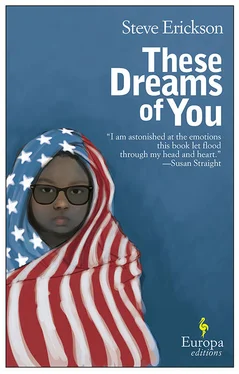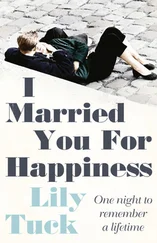Dusk falls and what’s left of the light leaks from the day. Zan wedges a flashlight between the bridge’s rafters and turns it on, splashing it against the ceiling of the old railroad car. Both kids are asleep where Viv made a bed, but after half an hour Sheba rises and walks over and for the first time since London slips into her mother’s arms there in the rocking chair — where years ago Viv breast-fed her son — that Zan borrowed but she has taken back.
As Viv rocks in the chair to her daughter’s new music, Sheba curls in her mother’s arms as she used to with the guard at the orphanage back in Addis Ababa, when as a two-year-old she rose in the night and ran through the yard in the rain to his post at the gate. Asleep, the girl dreams of the leviathan wave that roars through the mouth of the canyon but, reaching the railroad bridgehouse and lifting it from its moorings like a boat, becomes a gentle tide sailing her family to somewhere better.
Though to the outer waking world Sheba’s dream is only a few seconds, in her sleep she understands it’s a long voyage. Poised at the ship’s bow, transmitting a distant song, she sails in search of the word that will name her, a word for those who’ve never belonged anywhere and who make their own belonging in the same way that people used to name themselves after where they belonged, the same word as that for the grief that goes on grieving for what’s not remembered but can’t be forgotten. As the girl and her brother and mother and father step from the boat onto shore, the word isn’t paradise or heaven or utopia or promisedland but rather a name as damaged as it is spellbinding to everyone who’s heard it since the first time anyone spoke it, then tarnished it, then hijacked it, then exploited it, then betrayed and debased and then emptied it, loving the sound of it while despising everything it means that can’t be denied anyway because it’s imprinted on the modern gene which is to say that even as the girl pursues it, it’s already found her, passed on by her adopted father in whose ear it was whispered one afternoon when, from a crowd desperate to hear the secret of it, he was pulled by a young woman of the Old World and the beginning of time, and now it binds daughter and father though neither knows it, she carries it in her fierce core, armed to defend it with that blade of a finger she draws across her throat, and the word is america.
Steve Erickson is the author of eight previous novels as well as two nonfiction books about politics and popular culture that have been published in ten languages around the world. Currently he’s the editor of the national literary journal Black Clock , published by the California Institute of the Arts where he teaches, and he also writes about film for Los Angeles magazine, for which he’s been nominated for the National Magazine Award. He has received the American Academy of Arts and Letters award in literature and a fellowship from the John Simon Guggenheim Foundation.











